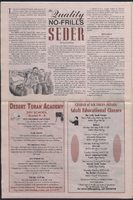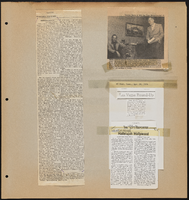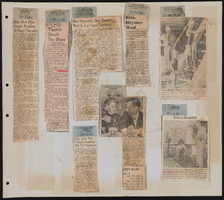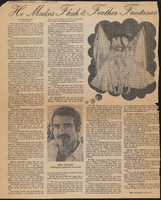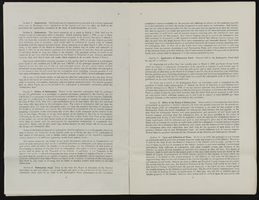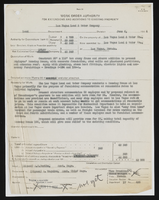Search the Special Collections and Archives Portal
Search Results
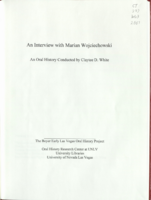
Transcript of interview with Marian Wojciechowski by Claytee White, June 16, 2009
Date
Archival Collection
Description
At age 95, Marian Wojciechowski recalls his personal story of being born a region called called Poland in 1914, just as World War I was beginning. This narrative gives special attention to his Polish background at a time when the country did not technically exist, and their language was forbidden. By the late 1930s and the dawning of World War II, Marian is a young man struggling to understand what is transpiring, but knowing that he must participate in the Polish underground resistance against the Germans His activism gets him arrested and sentenced to Auschwitz as a non-Jew and without penalty of death. He recalls the Gestapo beatings which have left him without feeling in his fingers and a loss of hearing. He shares historical perspectives of the war era, agricultural coops, goal of Germans to sell Jews to the United States and other countries, and a story about a woman who helped save 2500 Jewish children during war.
Text
Nevada Mining Photograph Collection
Identifier
Abstract
The Nevada Mining Photograph Collection depicts mining activities, miners, and mining towns in Nevada from 1868 to 1937. The photographs primarily depict the towns of Tonopah, Nevada and Goldfield, Nevada, including mills, buildings, mine shafts, and panoramic views of the landscape. The photographs also depict Beatty, Lost City, Delamar, Candelaria, Winnemucca, Virginia City, Rhyolite, Elko, and Reno, Nevada. The photographs also include portraits of early settlers in Nevada, Native Americans, children, parades, celebrations, and funerals.
Archival Collection

Sylvia Alvarado interview, April 12, 2019: transcript
Date
Archival Collection
Description
Interviewed by Rodrigo Vazquez, Monserrath Hernández, and Barbara Tabach. Sylvia Alvarado talks about growing up in North Las Vegas and her Catholic upbringing in a Mexican household. Her studies in Journalism & Media Studies led her to her career as a radio host on English and Spanish-speaking programs. She also talks about speaking "pocha" Spanish and the Latinx influence in radio programming.
Text
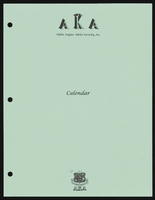
Alpha Kappa Alpha Sorority, Theta Theta Omega Chapter calendar
Date
Archival Collection
Description
From the Alpha Kappa Alpha Sorority, Incorporated, Theta Theta Omega Chapter Records (MS-01014) -- Chapter records file.
Text

